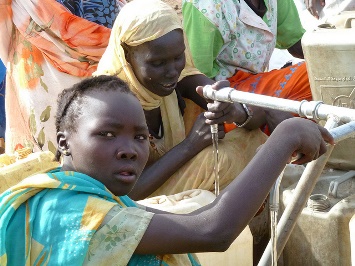Sudanese refugees help keep S. Sudan camps running as foreign workers pull out
January 9, 2014 (JUBA) – Refugees from Blue Nile state in neighbouring Sudan have mobilised to fill the void left by evacuated aid staff to help keep life in some of South Sudan’s largest refugee camps running smoothly, the UNHCR said on Wednesday.

The UN refugee agency said residents in the camps have stepped up to take on more responsibilities, including guarding warehouses packed with supplies belonging to UNHCR and aid agencies that left after the violence erupted between the South Sudanese government and opposition forces.
Refugees who had been trained as water pump technicians have also taken on a lead role within the camps, helping ensure pumps keep on working.
“This initiative is very positive. Refugees have taken control of the situation. They are making sure nothing is being touched. There has been no looting at all”, the UNHCR’s Adan Ilmi said.
A 22-year veteran of UNHCR, Ilmi heads the agency’s operations in Maban county capital Bunj, where he said he was now increasingly relying on refugees to take on more duties since the world’s newest nation plunged into violence on 15 December.
He is currently operating with a skeleton staff of 18 officers, one-fifth of his usual 85-strong workforce.
“We all go to the camps every morning and do whatever we can”, Ilmi said.
“It’s very important to go to the camps Sunday to Sunday to reassure the refugees we are still here with them”, he adds.
Many aid agencies pulled out of South Sudan or dramatically scaled back operations after violence broke out in Juba between rival members of the presidential guards, quickly spreading to other parts of the country, including Jonglei, Unity and Upper Nile states.
Ilmi concedes refugees at the camps are concerned about what the future holds should fighting continue indefinitely.
They have already fled violent conflict in their homeland, which has been the scene of an insurgency since 2011 led by rebels from the Sudan People’s Liberation Movement-North (SPLM-N), who are fighting the Khartoum regime.
Thousands of people, who lost their homes and livelihoods, have sought refuge in South Sudan and other neighbouring African countries.
UNHCR says it began training newly arrived Sudanese refugees in water management, camp management and healthcare, with a view to eventually reducing the number of international staff needed to run the camps. That plan has been suddenly tested after aid agencies began evacuating non-essential staff amid growing security concerns after the country plunged into violence.
Although fighting continues just 60kms away, Ilmi said morale among his remaining staff was high, and there were no signs that humanitarian workers or refugees at the camps are being targeted.
The UNHCR said the area remains at risk of being completely cut off by fighting, with its sister agency, the World Food Programme (WFP), recently distributing additional food rations.
(ST)
